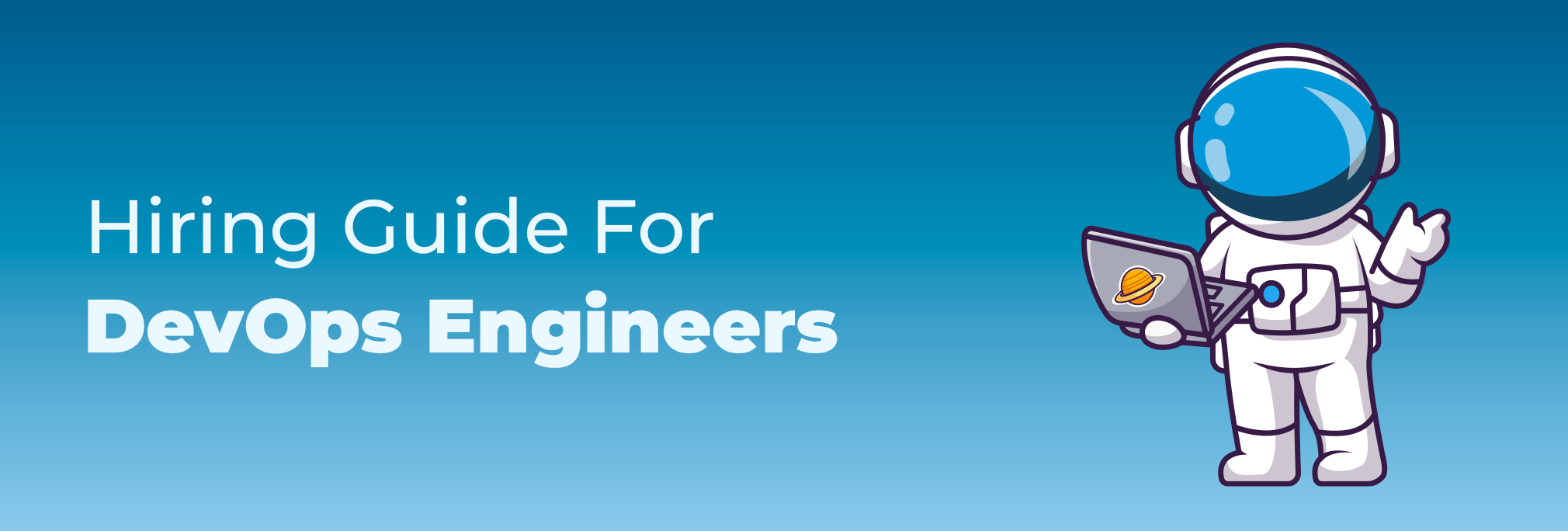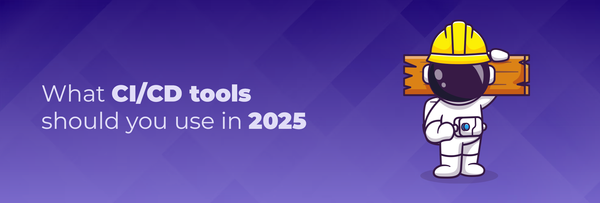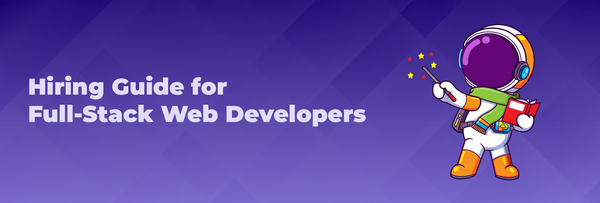Hiring Guide For DevOps Engineers

Are you struggling with the employee hire process for DevOps engineers?
Well, the good news is you are not the only one in this boat.
Many companies face the challenge of how to find and hire great employees for this pivotal role.
The importance of DevOps in today's tech world is undeniable, yet pinpointing the right talent often feels like finding a needle in a haystack.
Rest assured, our "Hiring Guide for DevOps Engineers" is here to help.
We’ll break down the DevOps role description and share proven strategies to streamline your hiring process.
With our expert insights, you'll be all set to attract and secure top-tier DevOps talent.
Dive in and revolutionize your hiring approach today!
What Is A DevOps Engineer And Why Would You Need One?
A DevOps engineer is a specialized IT professional responsible for bridging the gap between software development (Dev) and IT operations (Ops).
Their primary focus is on automating and streamlining the processes between software development and IT teams to improve the speed and quality of software delivery.
Role and Responsibilities of a DevOps Engineer
- Automation: Implementing automation tools and practices for continuous integration (CI) and continuous deployment (CD) pipelines to accelerate software development and deployment cycles.
- Infrastructure as Code (IaC): Using tools like Terraform or CloudFormation to manage and provision infrastructure resources efficiently and consistently.
- Monitoring and Logging: Setting up monitoring tools (e.g., Prometheus, ELK stack) to track application and infrastructure performance and integrating logging solutions for troubleshooting and auditing purposes.
- Collaboration: Facilitating collaboration and communication between development and operations teams to ensure smooth deployment and operation of applications.
- Security: Implementing security best practices and integrating security controls throughout the development and deployment processes (DevSecOps).
- Cloud Expertise: Leveraging cloud platforms (e.g., AWS, Azure, GCP) to deploy and manage applications, ensuring scalability, availability, and cost efficiency.
- Version Control: Managing code repositories using version control systems like Git, ensuring code integrity, and facilitating collaboration among team members.
- Configuration Management: Utilizing tools like Ansible, Puppet, or Chef to automate configuration management and ensure consistency across development, testing, and production environments.
- Containerization: Using containerization technologies such as Docker and container orchestration tools like Kubernetes to package applications and automate deployment, scaling, and management of containerized applications.
- Continuous Improvement: Continuously evaluate and improve processes and practices to enhance the efficiency, reliability, and performance of the DevOps ecosystem.
DevOps engineers play a crucial role in modern software development by promoting collaboration, automation, and efficiency across development and operations teams, ultimately contributing to the faster delivery of reliable software applications.
Popular DevOps Languages and Tools
Did you know that according to a survey conducted by Atlassian, 48% of developers attributed their salary increases to the adoption of DevOps practices?
DevOps engineers are key to organizations, facilitating quicker development cycles, seamless deployments, and improved teamwork.
They utilize various programming languages and tools that enhance scalability, modularity, and efficiency.
DevOps Programming Languages
Table 1
DevOps Scripting Languages
Table 2
DevOps Development Tools
Table 3
Key Skills For DevOps Engineers
DevOps engineers require a diverse set of technical skills that vary depending on team structure, technology stack, and toolsets.
Atlassian's research revealed that 78% of developers transitioning to DevOps needed to acquire new skills.
Here are some of the skills you might look for when hiring a DevOps Engineer.
Technical Skills
- Strong foundation in computer science: networking, databases, and distributed systems.
- Proficiency in building, managing, and optimizing CI/CD pipelines for efficient application deployment.
- Hands-on experience with container orchestration systems like Kubernetes.
- Proficiency in at least one mainstream programming language: Python, Ruby on Rails, or Go.
- Familiarity with Infrastructure As Code tools such as Terraform, Ansible, or Chef.
- Experience with logging, monitoring, and alerting systems.
- Comprehensive knowledge of information security practices.
Interpersonal Skills
- Facilitating collaboration by understanding and integrating diverse viewpoints.
- Ability to articulate technical concepts clearly to both technical and non-technical stakeholders.
- Skill in leading technical discussions to solve complex infrastructure, development, or security challenges.
- Experience in mentoring development team members on DevOps best practices.
- These combined skills enable DevOps engineers to streamline processes, enhance team synergy, and drive effective software delivery and infrastructure management.
Interview Questions
This section highlights essential interview questions to help you find the right candidate. Use these questions to assess both technical skills and cultural fit in your DevOps team.
- What is the difference between continuous integration, continuous delivery, and continuous deployment?
- How would you design a CI/CD pipeline for a microservices architecture?
- Can you explain the concept of Infrastructure as Code (IaC)? Which tools have you used for IaC?
- How do you handle secrets and sensitive information in your CI/CD pipeline?
- Describe your experience with containerization and orchestration tools such as Docker and Kubernetes.
- What are the key differences between Docker Swarm and Kubernetes?
- How do you monitor and log applications in a production environment?
- What is the role of configuration management in DevOps, and which tools have you used for it?
- Explain how you would implement a blue-green deployment strategy.
- What are some best practices for writing Dockerfiles?
- How do you manage and scale stateful applications in Kubernetes?
- What are the advantages and disadvantages of using serverless architecture?
- Can you explain how you would troubleshoot a failed deployment?
- What is a service mesh, and how does it benefit microservices architecture?
- How do you implement and manage load balancing in a cloud environment?
- What strategies do you use to ensure high availability and disaster recovery?
- Describe a situation where you had to optimize the performance of a CI/CD pipeline.
- What is the purpose of a reverse proxy, and how have you implemented it?
- How do you ensure security in your DevOps practices, especially regarding vulnerabilities in third-party libraries?
- How would you use a tool like Terraform or Ansible to automate infrastructure provisioning?
These questions will help you evaluate candidates' proficiency in critical areas such as CI/CD pipelines, containerization, infrastructure automation, and security practices, ensuring you hire the best fit for your team.
Insight into Hiring Models for DevOps Engineers
When considering the best approach to hiring DevOps engineers, organizations are presented with various models tailored to their unique needs and strategic goals:
- Full-time Employment
Opting for full-time DevOps engineers ensures stability and a dedicated focus on organizational objectives.
It fosters deep integration into company culture and long-term commitment, ideal for ongoing projects requiring consistent support and innovation.
Companies can leverage platforms like LinkedIn, Indeed, and Glassdoor for posting job listings and actively recruiting experienced DevOps professionals.
- Contract or Freelance Basis
Engaging DevOps engineers on a contract or freelance basis offers flexibility in scaling resources according to project demands.
It provides cost-effectiveness for short-term initiatives, though it may lack the continuity and deep engagement found in full-time roles.
Platforms such as Upwork, Freelancer, and Toptal are suitable for sourcing freelance DevOps engineers globally.
- Project-based Hiring
Hiring DevOps engineers for specific projects aligns resources directly with project needs, ensuring specialized expertise and efficient delivery.
This model requires meticulous project planning to manage transitions and optimize resource allocation.
Companies can utilize platforms like Hired, AngelList, and Stack Overflow Jobs to find DevOps engineers skilled in handling complex initiatives.
- Remote or Distributed Teams
Leveraging remote DevOps teams expands the talent pool globally, fostering diverse perspectives and 24/7 productivity.
Effective communication tools and cultural sensitivity are crucial for seamless collaboration across different time zones.
Remote job boards such as Remote.co, We Work Remotely, and RemoteOK facilitate global talent acquisition.
- Outsourcing
Outsourcing DevOps functions to external providers or Managed Service Providers (MSPs) offers access to specialized skills without the overhead of maintaining an in-house team.
It requires careful oversight to maintain service quality and data security.
Companies can find reputable providers through platforms like Teamo, Clutch, G2, and CIO Review.
Choosing the right hiring model involves assessing factors such as project scope, budget, timeline, and organizational culture, aligning the approach with strategic objectives to optimize efficiency and overall success in DevOps initiatives.
Why Choose Teamo's Platform for Hiring DevOps Engineers
Elevate your business with Teamo's cutting-edge talent solution!
Access top-tier, pre-screened DevOps engineers from emerging markets, seamlessly integrated as remote powerhouses in your development team.
- Seamless Integration: Onboard your remote team in 24 hours with effortless integration into your workflow.
- Fast and Affordable: Benefit from rapid deployment and cost-effective solutions that meet your budget.
- Extensively Vetted: Trust our rigorous vetting process to deliver highly skilled and reliable engineers.
Trusted by innovative companies like ConvertDigital, Sohookd, Capmo, and Surf (Neon), Teamo empowers you to scale your engineering capabilities with ease.
Our AI-driven platform delivers a curated list of candidates perfectly matched to your requirements, ensuring rapid deployment and minimal operational burden.
- Zero-Risk Trial: Test-drive your new team member with a 2-week trial period to ensure they're the perfect fit for your team's dynamics and goals.
- Monitor and Manage with Ease: Keep track of your team's performance effortlessly using our intuitive dashboard, ensuring clarity and productivity at every step.
- Join the Future of DevOps Hiring: Discover why businesses trust Teamo to build high-performance engineering teams that drive success.
Let's elevate your development capabilities today!
FAQs
- Does DevOps involve coding?
DevOps encompasses a blend of development (Dev) and operations (Ops), where coding plays a crucial role.
DevOps engineers often write scripts and utilize coding to automate processes, manage infrastructure as code, and integrate tools for continuous integration and delivery (CI/CD).
- What are the key components of DevOps?
Key components of DevOps include automation, continuous integration (CI), continuous delivery/continuous deployment (CD), monitoring, and collaboration tools.
These components enable teams to streamline development workflows, enhance deployment efficiency, and improve overall software quality.
- Is DevOps easy to learn?
DevOps combines principles and practices that require familiarity with cloud services, automation tools, coding, and collaboration.
While mastering DevOps principles like infrastructure as code and continuous deployment can be challenging, gaining proficiency through hands-on experience and continuous learning is achievable and rewarding.




